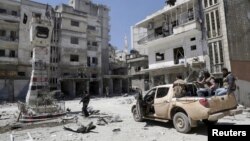Economic strain is draining Syria and the beleaguered government of President Bashar al-Assad is stretching for any cash it can generate, from raising taxes on imported goods to doubling fees for the renewal of passports. To tide things over, Damascus is close to finalizing a second billion dollar credit line with ally Iran.
The four-year-long civil war coupled with the international economic sanctions on Iran and Russia, reducing what aid they can give, has battered the economy. Field commanders trying to end rebel offensives in both the north and the south of the country have resorted to pleading with their superiors in Damascus for resupplies.
In an audio recording leaked this month, Syria’s top battlefield commander, Colonel Suhail al-Hassan, nicknamed The Tiger, is heard imploring a top official in Damascus, believed to be Syrian Defense Minister Fahad Jassim al-Freij, for more ammunition for his forces in the northern Syrian city of Aleppo.
Syria’s central bank governor told Bloomberg News Thursday that Damascus is close to finalizing a second billion dollar credit line from ally Iran, but the number of trips Assad government officials have made to Tehran in recent weeks could suggest negotiations were not easy. Iran provided the first credit line in 2013 and bank governor Adib Mayaleh said Syria still has money left from the first $1 billion loan, which helps finance government imports.
For ordinary Syrians, each day brings higher costs. Consumer goods coming in are now facing higher fees, said a Damascus trader contacted by email. Abdullah, who asked for his full name not to be revealed, fearing retaliation by the Assad government, says each month the “government is demanding higher and higher fees.” Syria's slumping currency — it has fallen from 50 pounds to the dollar before the war to up to 350 to the dollar on the black market — makes purchasing imported goods increasingly prohibitive for ordinary Syrians, who complain their savings have now been exhausted.
As well as increasing fees on goods, the government appears to be scrambling to raise cash anyway it can — including doubling fees on getting a new passport or renewing an old one, while at the same time enticing more Syrians to secure travel documents. A new passport now costs $400 and a renewal $200. Until recently for the up to 5 million Syrian refugees who have fled the country, renewing their passports was virtually impossible, requiring a variety of accompanying documents hard to get without being present in the country. It also required an intelligence review — but not any more.
This month Syrian authorities announced they will now allow citizens abroad, including refugees who fled the war, to obtain passports from overseas missions without an intelligence service review and without a lot of the documentation required before. Passports will be issued to Syrians "even if they left in an illegal manner or they hold non-official passports or travel documents,” Syria’s Al-Watan newspaper reported. The newspaper, which is close to the Assad government, spun that the new easier procedures for passport renewal was taken to “create an appropriate climate" for the peace consultations in Geneva currently under way. But it also conceded the new rules would be "an important source of foreign exchange."
“This is about money and getting money pure and simple — and everyone knows that,” said 20-year-old Naima, a refugee currently in Turkey. She has been without a passport, and like many Syrians who fled the country illegally, feared returning to apply for one. Many refugee men of conscription age, whose passports have expired, have not dared set foot in the country to renew them. Others, if they had the money, would pay a fixer in Damascus about $500 to bribe officials to arrange a renewal.
“This is a clever way to raise money — thousands of refugees will jump on the chance to get valid passports,” said another refugee, Mohammed, who is in Istanbul with his wife and young child and feared returning and being conscripted.
Analysts say the improvised survival tactics that both ordinary Syrians as well as their government have had to employ to weather the war are starting to give out. Half of Syria’s GDP has been lost as a result of the war. Exports are running at less than 20 percent of what they were at the start of the war. The main border crossing with Jordan has now been seized by rebels, which will further reduce Syria’s meager exports. And while Syria’s Central Bank governor told Bloomberg that the government still has dollar reserves, most economists think they were long ago exhausted and that the government is living hand-to-mouth.
Last week, Iran's deputy foreign minister, Amir Abdollahian, urged Syria to follow the Iranian model in face of deprivation and become self-sufficient with a “resistance economy.”
The panicky pleading by the infamous Colonel Suhail al-Hassan for more ammunition prompted widespread attention in the Middle East media. It raised questions "about the future of the Syrian Army,” according to Dr. Yaron Friedman, an Israeli commentator. “Is the regime again on the verge of collapse like it was in 2012?”
In an interview Wednesday, Syrian President Bashar al-Assad acknowledged his forces have suffered a string of defeats in recent battles with the insurgents. During a ceremony in Damascus commemorating Martyrs Day, Assad referred to recent rebel gains as the “ups and downs” of war, but he painted a more sober picture of the fighting and urged Syrians to “boost the morale” of their Syrian government soldiers.

